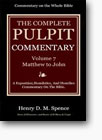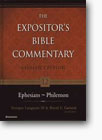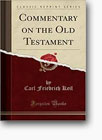- Table of Contents
- Introduction
- 1. The Beatitudes: Matthew 5:3-11
- 2. The Beatitudes: Matthew 5:3-11, Continued
- 3. The Beatitudes: Matthew 5:3-11, Continued
- 4. The Beatitudes: Matthew 5:3-11, Concluded
- 5. The Ministerial Office: Matthew 5:13-16
- 6. Christ and Law: Matthew 5: 17, 18
- 7. Christ and Law: Matthew 5: 17, 18, Continued
- 8. Christ and Law: Matthew 5: 17, 18, Concluded
- 9. The Law and Murder: Matthew 5:21-26
- 10. The Law and Murder: Matthew 5:21-26, Concluded
- 11. The Law and Adultery: Matthew 5:27-32
- 12. The Law and Adultery: Matthew 5:27-32, Continued
- 13. The Law and Adultery: Matthew 5:27-32, Concluded
- 14. The Law and Oaths: Matthew 5:33-37
- 15. The Law and Oaths: Matthew 5:33-37, Concluded
- 16. The Law and Retaliation: Matthew 5:38-42
- 17. The Law and Retaliation: Matthew 5:38-42, Continued
- 18. The Law and Retaliation: Matthew 5:38-42, Concluded
- 19. The Law and Love: Matthew 5:43-48
- 20. The Law and Love: Matthew 5:43-48, Continued
- 21. The Law and Love: Matthew 5:43-48, Concluded
- 22. The Giving of Alms: Matthew 6:1-4
- 23. Prayer: Matthew 6:5-8
- 24. Prayer: Matthew 6:9-13
- 25. Prayer: Matthew 6:14, 15
- 26. Fasting: Matthew 6:16-18
- 27. Fasting: Matthew 6:16-18, Concluded
- 28. Covetousness Corrected: Matthew 6:19-21
- 29. Covetousness Corrected: Matthew 6:19-21, Concluded
- 30. The Single Eye: Matthew 6:22, 23
- 31. The Single Eye: Matthew 6:22, 23, Concluded
- 32. Serving God: Matthew 6:24
- 33. Anxiety Forbidden: Matthew 6:25
- 34. Anxiety Forbidden: Matthew 6:25, Continued
- 35. Anxiety Forbidden: Matthew 6:28, 29
- 36. Anxiety Forbidden: Matthew 6:30, 31
- 37. Anxiety Forbidden: Matthew 6:32-34
- 38. Anxiety Forbidden: Matthew 6:32-34, Concluded
- 39. Unlawful Judgment: Matthew 7:1
- 40. Judging Others: Matthew 7:1
- 41. Dissuasives from Judging Other: Matthew 7:2-4
- 42. Helping Erring Brethren: Matthew 7:5
- 43. Unlawful Liberality: Matthew 7:6
- 44. Seeking Grace: Matthew 7:7, 8
- 45. Seeking Grace: Matthew 7:7, 8, Continued
- 46. Seeking Grace: Matthew 7:9-11
- 47. The Golden Rule: Matthew 7:12
- 48. The Way of Salvation: Matthew 7:13, 14
- 49. The Way of Salvation: Matthew 7:14, 15
- 50. False Prophets: Matthew 7:15
- 51. False Prophets: Matthew 7:15, Continued
- 52. False Prophets: Matthew 7:15, Continued
- 53. False Prophets: Matthew 7:15, Continued
- 54. False Prophets: Matthew 7:15-20
- 55. False Prophets: Matthew 7:15-20, Concluded
- 56. Profession Tested: Matthew 7:21-27
- 57. Profession Tested: Matthew 7:21-27, Continued
- 58. Profession Tested: Matthew 7:21-27, Continued
- 59. Profession Tested: Matthew 7:21-27, Continued
- 60. Profession Tested: Matthew 7:21-27, Continued
- 61. Profession Tested: Matthew 7:21-27, Continued
- 62. Profession Tested: Matthew 7:21-27, Continued
- 63. Profession Tested: Matthew 7:21-27, Concluded
- 64. Conclusion: Matthew 7:28, 29
An Exposition of the Sermon on the Mount
by Arthur W. Pink
Chapter Twenty-Nine
Covetousness Corrected - Concluded
Matthew 6:19-21
"Lay not up for yourselves treasures upon earth, where moth and rust doth corrupt, and where thieves break through and steal" (v. 19). Let it be borne in mind that when our Lord uttered these words there were no such things as banks or government security-bonds, that the rich were chiefly distinguished by their costly wardrobes, hoards of precious metals and jewels. Nevertheless, modern life affords no real guarantee of protection: it is still true that "riches certainly make themselves wings: they fly away as an eagle" (Prov. 23:5). All happiness of a worldly sort is evanescent: all carnal enjoyments are perishable in themselves: all earthly possessions are liable to theft.
"Lay not up for yourselves treasures upon earth." It should be pointed out that there is no sin in the possessing of a considerable amount of earthly riches, providing they are come by honestly. God greatly prospered Abraham in temporal things, yet He reminded him "I am thy shield, and thy exceeding great reward" (Gen. 15:1). Job was the owner of vast herds and flocks, and though for a season he was without them, yet "The Lord blessed the latter end of Job more than his beginning: for he had fourteen thousand sheep, and six thousand camels, and a thousand yoke of oxen, and a thousand she asses" (42:12). So, too, David was permitted to acquire an immense amount of material wealth, yet he regarded not his "treasure" as being in this world. On the contrary he was sharply distinguished from worldlings, who had "their portion in this life," declaring "As for me, I will behold Thy face in righteousness: I shall be satisfied, when I awake, with Thy likeness" (Ps. 17:14, 15). It is just as true that it is the Lord who "giveth thee power to get wealth" (Deut. 8:18) as it is that He alone enriches the soul spiritually.
What, then, is it which Christ here prohibits, when He says "Lay not up for yourselves treasures upon earth"? Why, He forbids us making material things our chief concern, either in the pursuit or in the enjoyment of them. He forbids us either seeking or expecting our ultimate happiness in any earthly object. He forbids us setting our affections on anything seen and temporal, with the fond imagination that it is capable of satisfying the heart. It is not sinful for a man to seek after the necessities of life, either for his present or future use, but it is wrong for him to give way to a spirit of covetousness and strive after worldly wealth without moderation. "Let us, therefore, receive and lawfully enjoy that portion of this life which our Father in heaven is pleased to bestow upon us, but let us not set our affections upon them" (John Brown).
In the above commandment Christ condemned those who seek principally after worldly goods, disparaging and disregarding the true riches. This is clear from the opposition made in the next verse, where "lay up for yourselves treasures in heaven" is placed over against "lay not up for yourselves treasures upon earth." Such was the sin of Esau, who is termed a "profane person" because he sold his birthright for a mess of pottage. So, too, Christ here condemned those who put their trust and confidence in the worldly things they amass, for this is idolatry of the heart. In like manner He here reprehended the making of earthly riches our chief good and delight for He warns us that where our treasure is, there will our heart be also. Christ also condemned the selfish practice of laying up for ourselves only, without regard to using the same to the glory of God and the good of our generation, which is a grievous betrayal of our stewardship. Each of us will yet be called upon to render an account unto God.
"Lay not up for yourselves treasures upon earth, where moth and rust doth corrupt and where thieves break through and steal." In the second part of this verse Christ enforced His commandment with reasons drawn from the corruptibility and uncertainty of worldly possessions. Therein He shows us the vanity of the creature, both in respect of its nature and of its abuse. Be the treasures never so pure and costly, as gold and silver, furs and silks, yet are they subject to either rust or the moth. No matter how carefully they be tended, yet the thief may come and seize them. If it be asked whence cometh this vanity of the creature, the answer is, God has subjected them unto it for the fall of man (Rom. 8:20), to let us see the grievousness of our sin and the greatness of His anger upon it, by imprinting the stamp of His wrath on the creature. Hence, when we see a moth upon our garments or rust upon our silver, we ought to be humbled over our original apostasy and taught to hold the creature with a light hand.
"But lay up for yourselves treasures in heaven, where neither moth nor rust doth corrupt, and where thieves do not break through and steal" (v. 20). This was only another way of saying, "Labour not for the meat which perisheth, but for that meat which endureth unto everlasting life, which the Son of man shall give unto you (John 6:27). Instead of setting our affections upon and spending our strength in the acquirement of the perishing things of time and sense, we should desire and seek our happiness in spiritual and Divine objects which are incorruptible and eternal. Our real blessedness lies in a knowledge of God, a conformity to His image. a walking in His ways, a communing with Him: then shall we have a peace and joy which the creature can neither impart nor take from us. Men are ever seeking a safe place in which they may deposit their treasures, only to find that no place and no thing in this world is secure. If, then, we would have our treasure where no marauder can reach it, it must be hid in Christ with God (Col. 3:3).
Let us consider five things in connection with this laying up for ourselves treasures in heaven. First, the finding thereof. We can neither obtain nor make use of the great Treasure until it is located. This consists of God's revealing of it to us—for like Hagar of old (Gen. 21:19) we are blind thereto until He opens our eyes to see it; giving us to perceive our deep need of it—for until He does so we are self-complacent; and making us feel we are poor without it-for until He does so we are like the Laodiceans, "rich and increased with goods" in our own esteem. Not till then do we seek God in Christ with all our hearts. It is here we must examine and test ourselves: have we been made to realize our wretchedness and want: our filthiness and guilt, our deep need of cleansing and pardon? If so, are we truly hungering and thirsting after Christ's righteousness?
Second, having found this great Treasure, as it is exhibited in the Gospel and revealed in the soul by the power of the Holy Spirit, we must highly prize and value it, above all that we have or desire, regarding it as worth far more than the whole world. Such we find was Paul's estimate of this Treasure: "I count all things but loss for the excellency of the knowledge of Christ Jesus my Lord: for whom I have suffered the loss of all things, and do count them but dung, that I may win Christ" (Phil. 3:8). The rating of Christ so highly is absolutely necessary if we are to lay Him up for our Treasure. Here too we must honestly and diligently test ourselves. Can we truly say with David, "Whom have I in heaven but Thee? and there is none upon earth that I desire besides Thee" (Ps. 73:25)? Does the general tenor of our lives bear witness to the fact that we value spiritual things above all else? Is it true of us that "The law of Thy mouth is better unto me than thousands of gold and silver . . . I love Thy commandments above gold; yea, above fine gold" (Ps. 119:72, 127)?
Third, having discovered this Treasure and perceived its inestimable worth, we must strive to obtain the same and make it our own. As said the wise man, "If thou criest after knowledge, and liftest up thy voice for understanding; if thou seekest her as silver, and searchest for her as for hid treasures; then shalt thou understand the fear of the Lord and find the knowledge of God" (Prov. 2:3-5). We are required to use the means which God has appointed for this purpose, which are hearing, reading, praying, exercising faith. In His written Word and preached Gospel God's two hands do, as it were, hold out to us this heavenly Treasure and all spiritual blessings, and our faith is the hand of the soul reaching out to receive, and by our prayers we testify our faith.
Fourth, having obtained this Treasure we must labour to assure it unto ourselves. To this end we must follow Paul's charge to rich men: "Charge them that are rich in this world, that they be not highminded, nor trust in uncertain riches, but in the living God, who giveth us richly all things to enjoy; That they do good, that they be rich in good works, ready to distribute, willing to communicate; Laying up in store for themselves a good foundation against the time to come, that they may lay hold on eternal life" (1 Tim. 6:17-19). By trusting in the living God, and then by giving liberally unto the needy, we "lay up in store a good foundation." Are we saved, then, by performing such good deeds? No, for the ground of our salvation Godwards is in Jesus Christ (1 Cor. 3:11); but in our own conscience, for assurance of our interest in Christ, the fruits of faith and the works of love are our evidences. "We know that we have passed from death unto life, because we love the brethren" (1 John 3:14). Compare 2 Peter 1:10, and interpret "give diligence" by verses 5-7.
Fifth, being assured that this Treasure is ours, we must use the same as a treasure. This means that since Christ is in heaven our hearts are to be there too, and if our affections be set upon Him in desire and delight then our behavior will be spiritual and heavenly. If our souls be earthbound and our affections set wholly or even principally on the things of time and sense, then Christ is not our "treasure" at all. To use our Treasure aright means that we turn our earthly goods into heavenly substance, which we do when we truly employ them to the glory of God and the good of our fellows. "He that hath pity upon the poor lendeth unto the Lord; and that which he hath given will He pay him again" (Prov. 19:17). The merciful man, then, has the Lord for his Debtor, for He sends the poor man as His messenger unto the rich, to borrow of him such things as the poor man lacks; and the Lord's return of payment is in heavenly and spiritual blessings.
"The name of the Lord is a strong tower: the righteous runneth into it, and is safe. The rich man's wealth is his strong city, and as an high wall [affording protection], in his own conceit" (Prov. 18:10, 11). What a contrast is here presented between the use which the godly and the godless make of their respective "treasures," and how often we see it illustrated on the pages of Holy Writ. Take the case of Esau and Jacob. When the former lost his birthright and wept, how did he seek to comfort himself? by planning revenge (Gen. 27:41). But when Jacob was "greatly afraid and distressed" (Gen. 32:7) what did he do? Why, he had recourse to God (his "Treasure") and hoped in Him (vv. 9-11). So it was with Saul and David. When the former lost his kingdom (his "treasure") he said to Samuel. "Honour me now, I pray thee, before the elders of my people" (1 Sam. 15:30); but when David lost all at Ziklag he "encouraged himself in the Lord his God" (1 Sam. 30:6). "Unless Thy law had been my delights, I should then have perished in mine affliction" (Ps. 119:92) he exclaimed later. Whither do you turn in trouble? from whence do you seek relief?
"Lay up for yourselves treasures in heaven, where neither moth nor rust doth corrupt, and where thieves do not break through and steal"
(v. 20). As in the preceding verse Christ backs up His precept with a weighty consideration, one which is drawn from the unchangeability and absolute security of heavenly riches. The world may deem His followers crazy and losers because of their separation from its pursuits and pleasures, but the Lord assures them they shall be the everlasting gainers: whatever we do in His name and for His sake shall turn to our account in the day to come. "Whosoever shall give to drink unto one of these little ones a cup of cold water only in the name of a disciple, verily I say unto you. he shall in no wise lose his reward" (Matthew 10:42). God will liberally reward all denyings of self for Christ's sake: "Every one that hath forsaken houses, or brethren, or sisters, or father, or mother, or wife, or children, or lands, for My name's sake, shall receive an hundredfold, and shall inherit everlasting life" (Matthew 19:29). Let us, then, turn our earthly goods into heavenly substance and so heed our Saviour's exhortation: "Sell that ye have, and give alms; provide yourselves bags which wax not old, a treasure in the heavens that faileth not, where no thief approacheth, neither moth corrupteth" (Luke 12:33).
Who can wish for a better increase than that: the exchange of what is temporal and precarious for that which is eternal and imperishable? What abundant cause have Christians to adore the triune God for having begotten them unto "an inheritance incorruptible and undefiled, and that fadeth not away, reserved in heaven" for them (1 Pet. 1:4). What reason have they to love, trust, serve and glorify their God. Surely we should rather part with all that we have than with this Treasure—friends, goods, country, liberty, yea, life itself; thus it was with the primitive saints, who "took joyfully the spoiling of their goods, knowing in themselves that they had in heaven a better and an enduring substance" (Heb. 10:34). Those who have Christ for their Treasure find such satisfaction in Him that prosperity will not lift them too high nor adversity cast them down too low.
"For where your treasure is, there will your heart be also" (v. 21). This verse contains a further reason to enforce the commandment in the two preceding: it is common to both, persuading to the obedience of each. The force of this reason may be stated thus: where your treasure is, there will your heart be also: but your heart should not be wedded to earthly objects but to heavenly, therefore lay not up for yourselves treasures in earth but in heaven. By "treasure," as we have stated before, must be understood things which are excellent and precious in our esteem, things laid up for the time to come, wherein we repose our trust and in which we take a special delight. By "heart" we must conceive not only the affections but thoughts, imagination, and will, with the effects of them in action, such as deliberation and endeavor.
Let us try and point out some of the practical uses to which verse 21 may be put. First, how it shows the vast importance of our choosing the right kind of treasure. Oh, how deeply it concerns us for time and eternity that we make a wise selection, for the temper of our minds and the tenor of our lives will be carnal or spiritual according as our treasure is earthly or heavenly. "The heart follows the treasure as the needle follows the loadstone" (Matthew Henry). Whichever way be the direction of our deepest longings, thither will follow our efforts. This from the very constitution of our nature: that which we deem our chief good will employ our principal thoughts, draw forth our fixed longings, stimulate our most earnest endeavors. If we think that happiness is to be found in anything of earth then our whole character will be "of the earth earthy," for our desires and pursuits will all correspond with the object of our supreme satisfaction. But if we be persuaded that true happiness is only to be found in knowing, loving and serving God. walking and communing with Him, then will our character be spiritual, and our thoughts, desires and pursuits will correspond thereto.
Second, since heart and treasure go together, then how important it is that we learn to search out and try the state of our own hearts. It is true that the heart of fallen man is deceitful above all things and that none of us can know it thoroughly, nevertheless if we rightly apply this dictum of Christ unto ourselves, we ought to be able to give a true judgment of our spiritual state. Consider: an earthly treasure and an earthly heart: a heavenly treasure and a heavenly heart—these cannot be severed from each other. Therefore we must diligently inquire: Whereon is my love placed, my mind fixed, my care bestowed, my labours directed, my delights found? If honesty requires me to answer upon an earthly object, then my heart is earthly, and consequently all my church attendance and religious profession is vain (Ps. 10:4; Ezek. 33:31). But if my chief love and delight and my constant concern be a conformity to His image, and my daily endeavour be seeking to please and obey Him, then is my heart heavenly (Ps. 139:17, 18; Isa. 26:9).
Third, this coupling together of the heart and treasure shows us the relative value of the two worlds (this and the one to come) and informs us which of them should be chiefly esteemed and sought after by us. In comparison with heaven, the earth and mundane life are to be despised. We say the relative value of the two worlds, for we must not be unthankful to God or look with contempt upon the products of His hands. As earthly creatures are the workmanship of God and temporal mercies His blessings, they are not to be hated but received with gratitude and used to His glory; nevertheless, we must not suffer them to obtain in our hearts that place which is due alone to the Creator of earth and the Giver of every blessing. As high as heaven is above the earth and as long as eternity exceeds the duration of time, so far are spiritual things to be esteemed above material; and the more our "treasure" truly is in heaven, the less disposed shall we be to amass earthly wealth and the more inclined to improve (as means to an end) the things of time and sense.











Comments